Key takeaways:
- Pro-life advocacy encompasses more than just opposition to abortion; it includes support for vulnerable populations and promoting a culture that values life and understanding.
- Open debates foster empathy and connection, allowing individuals to confront discomfort constructively and potentially transform divisive conversations into opportunities for understanding.
- Vulnerability in discussions can shift the tone, enabling deeper connections and promoting authenticity, which ultimately cultivates trust and compassion among participants.
- Sharing personal experiences in debates about sensitive topics, like pro-life issues, can help bridge gaps between differing beliefs and deepen the conversation.
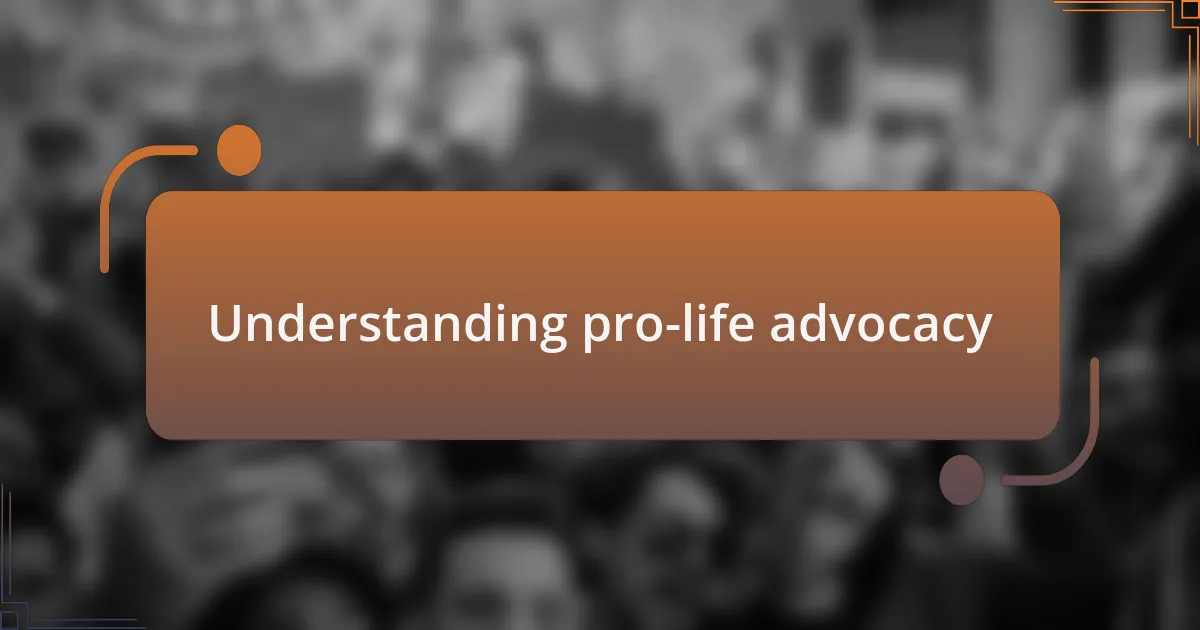
Understanding pro-life advocacy
Pro-life advocacy centers on the belief that human life begins at conception and deserves protection. For many individuals, this isn’t just a philosophical stance but a deeply emotional conviction rooted in personal experiences and values. I still remember the moment I first held my newborn niece; it was a profound reminder of the beauty and sanctity of life at its earliest stages.
Understanding pro-life advocacy also involves recognizing its multifaceted nature. It isn’t solely about opposing abortion; it includes advocating for vulnerable populations, such as pregnant women in crisis situations and children in foster care. Have you ever considered how interconnected these issues are? I often reflect on my conversations with women who felt pressured into decisions they weren’t ready for, and their stories fuel my commitment to enhancing support systems.
Finally, the heart of pro-life advocacy lies in promoting a culture that values life, love, and support. Engaging with those on different sides of the debate can be intimidating, but it’s essential. I’ve found that vulnerability and openness can foster meaningful dialogue, allowing us to express our beliefs while simultaneously understanding others’ perspectives. Through these exchanges, we can build bridges rather than walls.
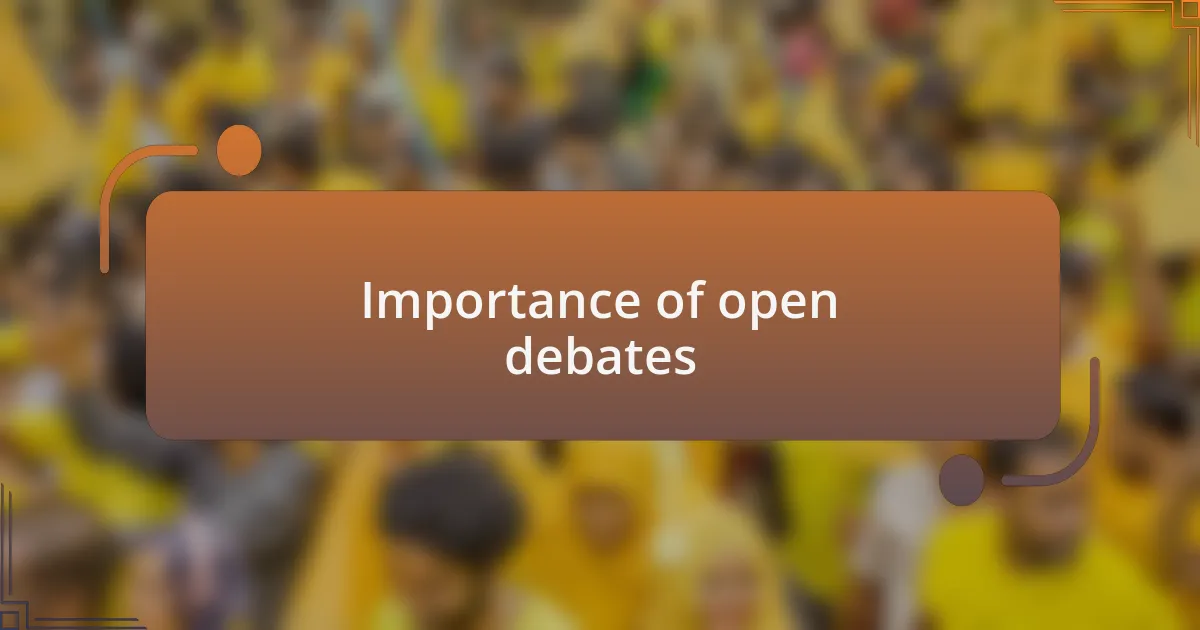
Importance of open debates
Open debates are essential because they create a space for honest exchanges about complex issues. I often think about a debate I participated in where opposing views collided. What struck me was how the raw emotion in the room revealed shared humanity beneath our differing beliefs. This experience taught me that the willingness to engage openly can lead to unexpected understanding.
When we embrace open discussions, we allow ourselves to confront discomfort in a constructive manner. I recall a moment when a particularly heated debate left me feeling overwhelmed. Yet, it was this very discomfort that prompted me to reevaluate my stance and listen more intently to the stories of others. Have you ever had a moment like that? It can be transformative.
Moreover, open debates cultivate empathy, turning divisive conversations into opportunities for connection. I remember chatting with a friend whose views on pro-life issues differed significantly from mine. By approaching our discussion with openness, we not only learned from each other but also strengthened our friendship. It’s a vivid reminder that understanding can emerge from vulnerability, bridging gaps we often consider unbridgeable.
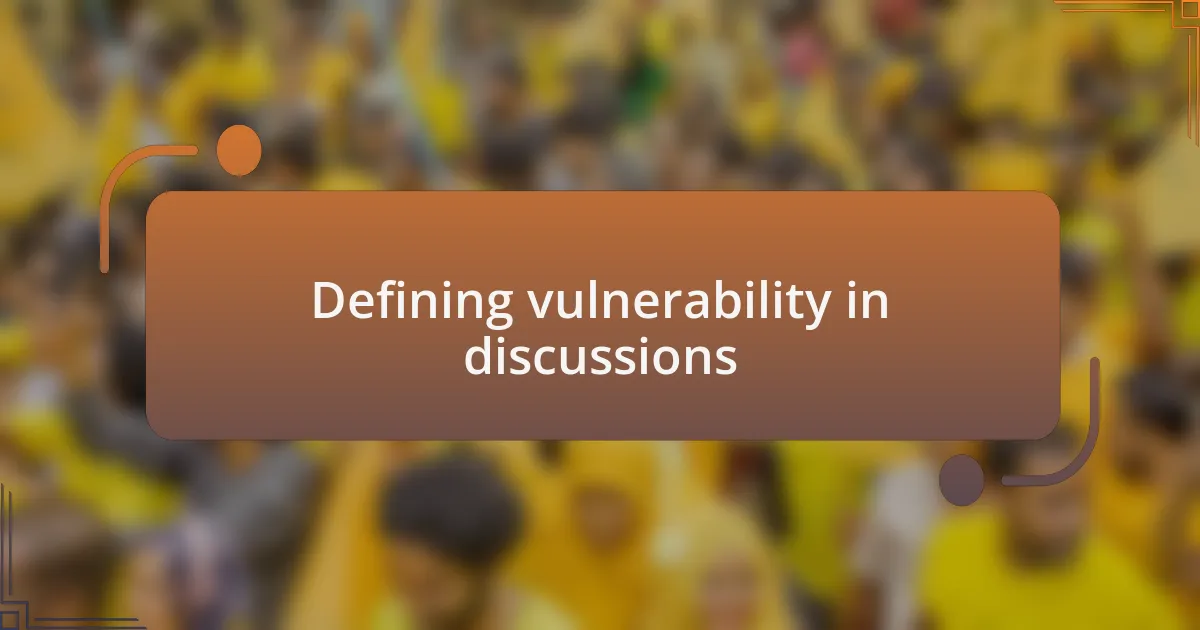
Defining vulnerability in discussions
Vulnerability in discussions refers to the willingness to share one’s feelings and uncertainties, especially when engaging in challenging debates. I remember a time when I hesitated to voice my doubts about a commonly accepted viewpoint in a pro-life discussion. That moment of hesitation made me question whether being open about my uncertainties would weaken my arguments or strengthen the connection with others. It turns out that embracing those vulnerabilities often invites deeper conversations.
When I think of vulnerability, I see it as a bridge, not a weakness. There was an instance during a panel discussion where a fellow advocate shared a personal story about their experiences with loss and choice. That moment shifted the atmosphere entirely; suddenly, the debate was no longer just about ideas but about real lives and emotions. This personal insight resonated with me and reminded me that discussions become richer when we make space for our genuine selves.
Engaging vulnerably invites others to let their guards down too. I’ve found that when I express my own fears or hesitations in debates, it encourages others to reciprocate with their authentic feelings. Have you noticed how sharing a story can set a new tone? When we create an environment where vulnerability is welcomed, we pave the way for understanding, empathy, and ultimately, a more profound discussion.
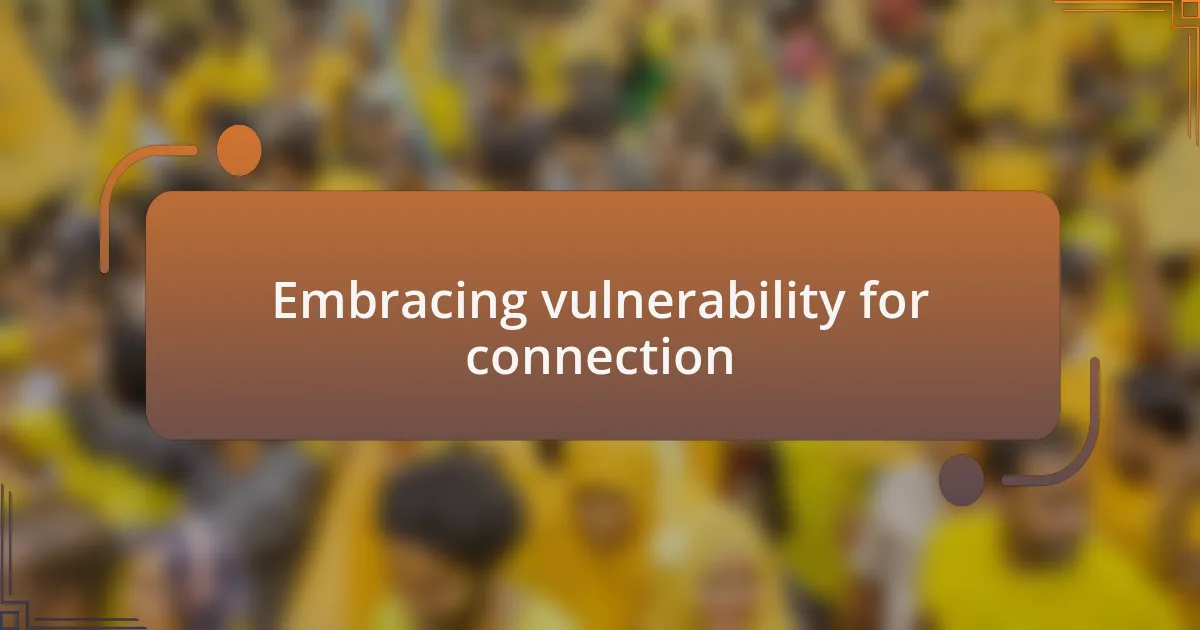
Embracing vulnerability for connection
Embracing vulnerability for connection requires stepping outside our comfort zones. I recall one debate where I boldly shared my struggle with reconciling pro-life beliefs with the complexities of real-life situations. That confession didn’t just open up the floor for dialogue; it allowed others to share their own multifaceted experiences, creating a tapestry of connection that statistics or facts alone couldn’t achieve.
What I’ve observed is that showing vulnerability lays a foundation for trust. In a recent discussion, I dared to share how an experience with a close friend who faced an unplanned pregnancy affected my views. The reaction was striking—what started as a tense debate transformed into a heartfelt exchange, highlighting our shared humanity. It’s intriguing how vulnerability can shift a conversation from abstract positions to the real emotions behind them.
Have you ever considered how vulnerability might make others feel safe to express their own uncertainties? I’ve noticed that when I expose my own doubts during debates, it not only brings relief but also encourages others to join in with their tribulations. The resulting conversations can forge deeper connections that are often missing in more guarded exchanges. By embracing our vulnerabilities, we not only connect individually but also lift the whole debate into a more compassionate space.
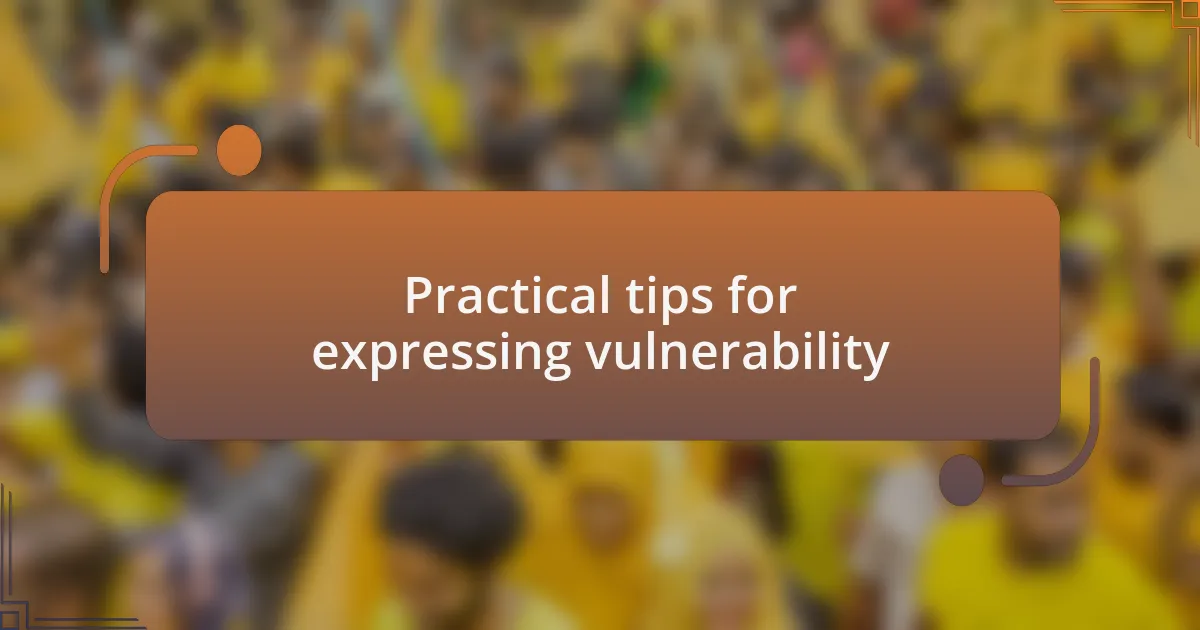
Practical tips for expressing vulnerability
A practical tip I’ve found effective is to use personal stories to illustrate your feelings. During one debate, I shared a moment when I felt overwhelmed by societal expectations regarding my stance. This transparency not only helped others see my genuine struggle, but it also prompted a cascade of shared narratives, making the discussion more relatable and humanizing.
Another approach is to express emotions honestly, even if they’re uncomfortable. I remember vividly a debate where I admitted feeling anxious about the backlash I might face when discussing sensitive topics. That vulnerability resonated with others, allowing them to voice their own fears and soften the atmosphere. Isn’t it interesting how acknowledging our fears can lighten the weight of the conversation?
Lastly, practicing active listening is crucial for creating a safe space. I’ve learned that when I respond thoughtfully to others’ vulnerabilities, it encourages them to be even more open. How many times have you seen a single expression of empathy transform a debate into a restorative dialogue? Engaging authentically truly fosters deeper connections and encourages a more compassionate exchange of ideas.
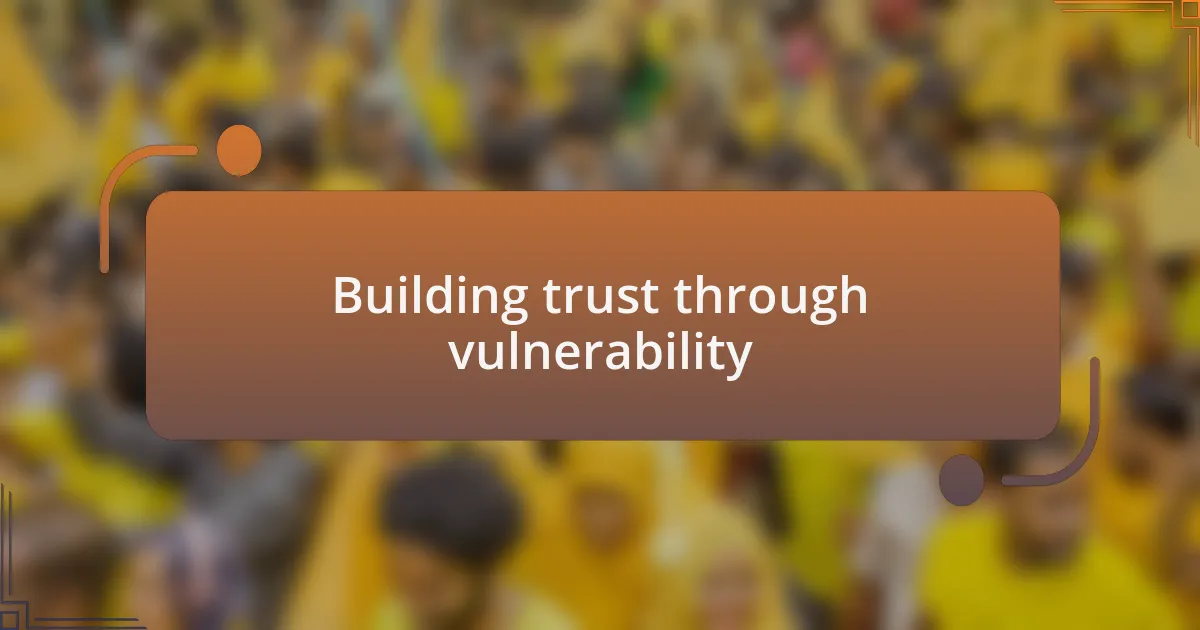
Building trust through vulnerability
When I think about trust in debates, I realize vulnerability can be a powerful tool. I recall a time when I opened up about my doubts regarding my own beliefs, sharing that I often question if I truly understand the complexities involved. It was fascinating to see how others responded with understanding rather than judgment, which in turn deepened our conversations. This experience taught me that showing our uncertainties can invite others to lower their defenses and engage more authentically.
An essential aspect of building trust through vulnerability is the willingness to share not just our successes but also our failures. I remember participating in a discussion about the consequences of advocacy, where I admitted a previous misstep in my approach. The room shifted—what was once a tense debate became a space for shared learning and collaboration. Reflecting on this, I can’t help but wonder: how often do we hold ourselves back from forming deeper connections because we fear showing our scars?
Embracing vulnerability also means being open to the emotional currents of the conversation. During one particularly charged exchange, I felt tears welling up as I shared a personal loss that informed my views. While it felt daunting at the moment, the emotional honesty created an unexpected bond amongst us all. Have you ever experienced that shift when personal stories resonate with others? It often leads to a richer, more profound understanding of the shared human experience, helping to cultivate a solid foundation of trust.
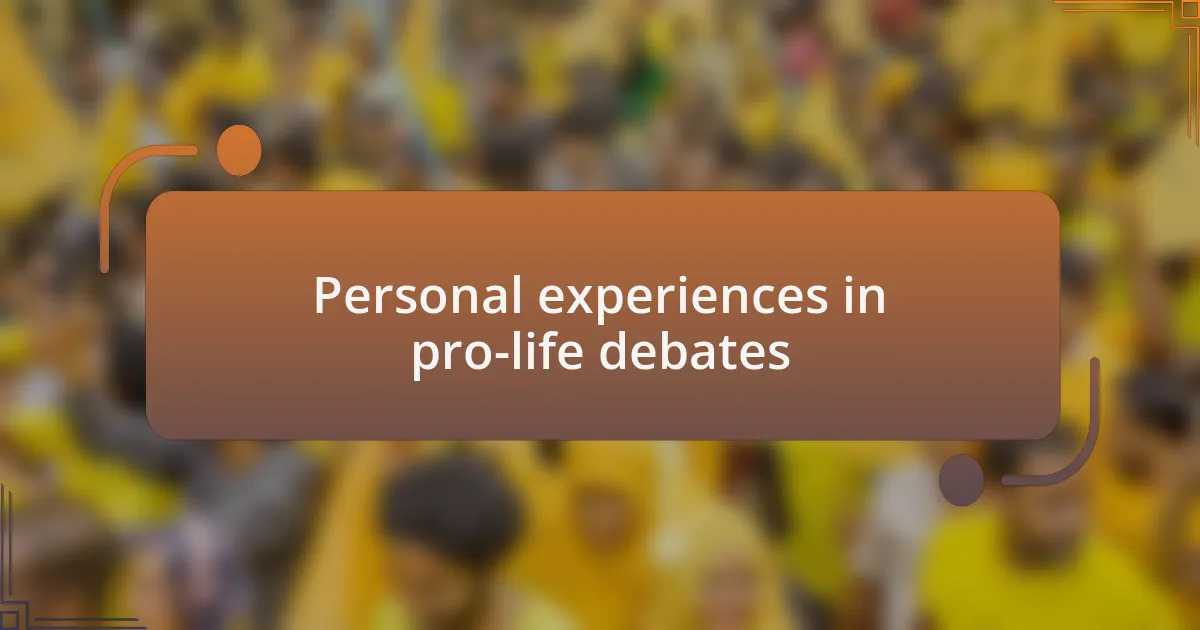
Personal experiences in pro-life debates
In my own journey through pro-life debates, I’ve found that sharing my family’s story added depth to the conversation. I once disclosed my mother’s struggles with her pregnancy, which opened a dialogue about the real complexities involved in making such personal choices. This moment reminded me how our stories can serve as bridges, connecting us even when our beliefs diverge.
I also remember a debate where I bravely admitted to feeling overwhelmed by the public discourse surrounding abortion. Expressing that vulnerability shifted the atmosphere; instead of a stark division between pro-life and pro-choice, we found common ground in our shared anxieties about the future. It made me realize that we often overlook the emotional weight these debates carry—not just for ourselves but for everyone involved.
Another impactful moment happened during a panel discussion when I described how my own experiences of doubt taught me to listen more intently. I reflected on times I spoke too passionately, unintentionally alienating those with differing views. That admission sparked an important exchange on how we can all strive to listen more compassionately. Have you ever felt the tension in conversations melt away when someone shares a genuine struggle? Embracing those moments of vulnerability truly enriches our debates.